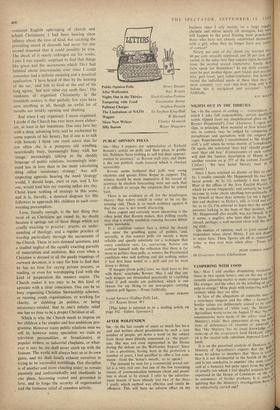Public Opinion Polls Henry Durant After Wolfeuden Kay Rogers Nights
Out in the Thirties Hugh Gordon Porteus Tampering with Food Gwendolen Barter Pullman Charges Stephen Preston The Limitations of NATO Sir Stephen Wagner R. Bat nard More New Writers Charles Monteith Silly Season Roger Musgrave PUBLIC OPINION POLLS.
SIR,---May I express my appreciation of Richard Rovere's article on polls and their place in public life. Pollsters-'have nothing to sell but their approxi- mation to accuracy,' as Rovere well says, and theirs is the one publicly made forecast which is checked inexorably.
Revere seems bothered that polls may swing elections and quotes Elmo Roper in support. The witness would be more impressive if his record of accuracy in election forecasting were not such that it is difficult to escape the suspicion that he retired hurt.
There is no evidence at all for the bandwagon theory--that voters switch in order to be on the winning side. There is so much evidence against it that the case is not worth discussing.
More cogent and certainly more interesting is the other point that Revere makes, that polling results may stop a worthy candidate running because defeat seems inevitable.
If a candidate cannot face a defeat he should not enter the gruelling game of politics, and, secondly, in this context polls are merely a more reliable and speedy substitute for a technique that every candidate uses. i.e., canvassing. Rome can comfort himself with the reflection that there is far more in politics than polls, as witness the Presidential candidate who said nothing and did nothing unless it had first been tested in a poll and yet he went down to defeat.
'If dangers [from polls] exist, we shall have to live with them,' concludes Revere. May I add that any such dangers are diminished practically to vanishing point if poll results are published; which is one reason for my liking to see newspapers carrying opinion poll figures.--Yours faithfully.
211 Regent Street, W1
[This letter is referred to in a leading article on page 392.—Editor, Spectator.]


































 Previous page
Previous page